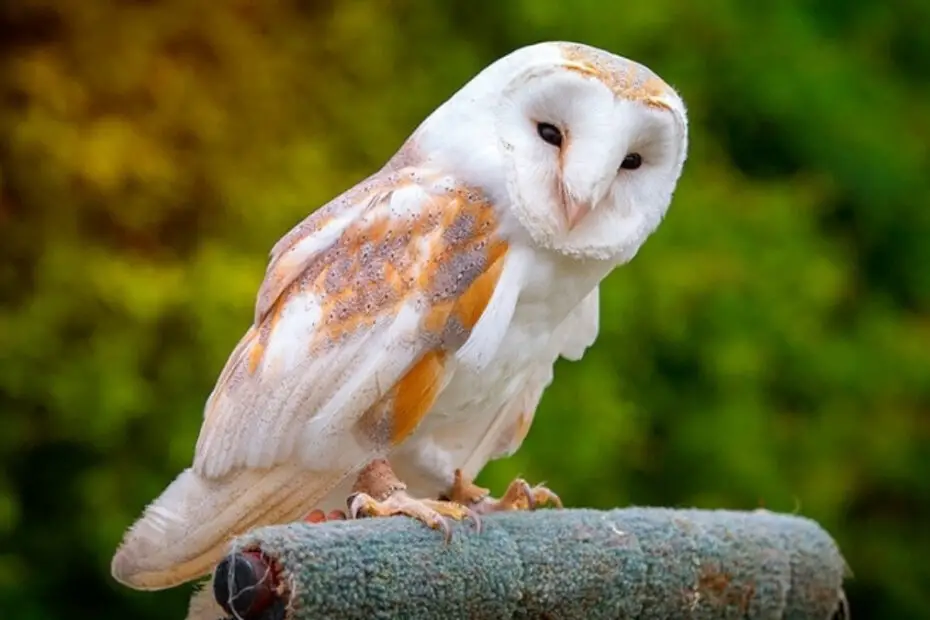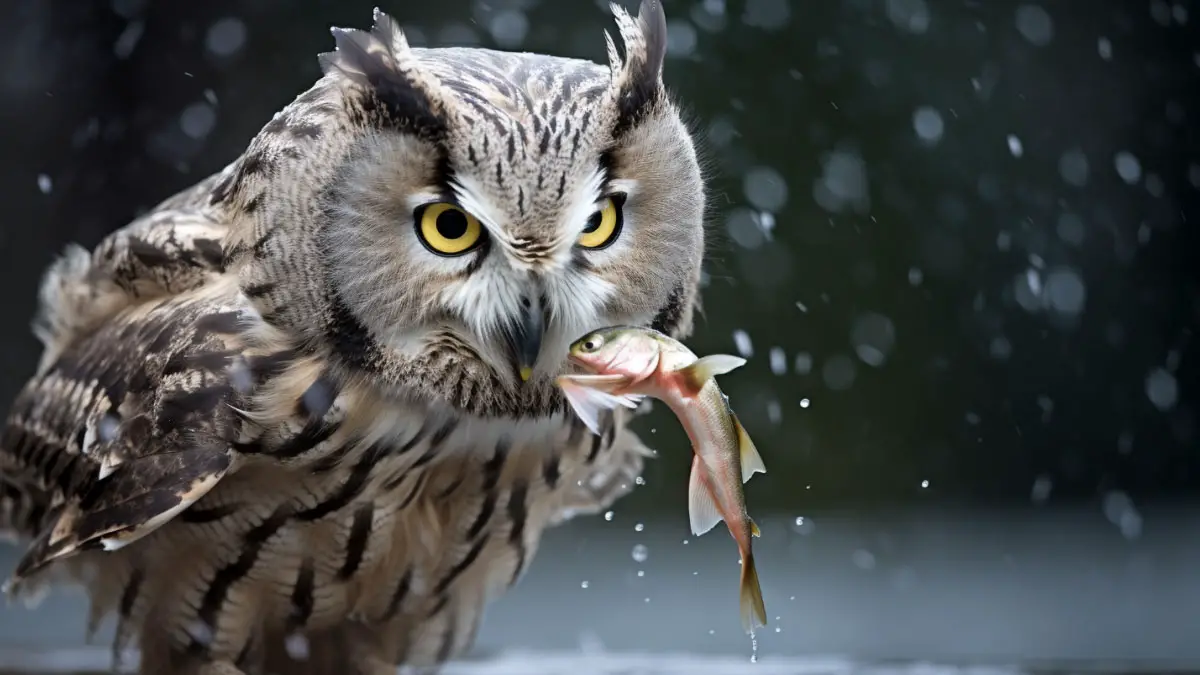Owls primarily consume a meat-based diet and are classified as carnivores. They feed on small rodents and insects but have been observed occasionally consuming non-meat diets as well.
But do owls eat fruits? Yes, owls eat fruits, but mainly as a last option when their preferred prey items are unavailable. Fruits contain nutrients and vitamins that can be helpful to their health. However, their digestive system doesn’t completely digest a plant-based diet, making it unreliable.
The article offers additional insight into whether owls can consume fruits, including which fruits they prefer. Keep reading to find out more.
Do Owls Eat Fruit?
Yes. Owls eat fruits and scientists have observed this evidence in their regurgitated pellets. Pellets usually tell scientists what a bird ate, and the presence of fruits in pellets means they had eaten fruits.
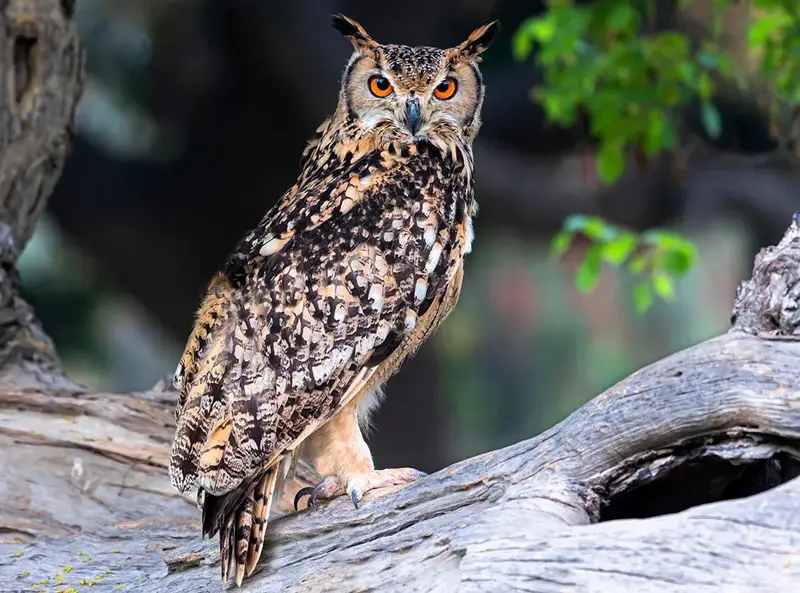
Owls are hunters who prey on various species of small mammals, insects, and occasionally birds. These raptors are opportunistic feeders who can feed on anything they find, especially in the absence of their usual prey.
However, to better understand why eating fruits may seem out of character for these birds, you must understand their diet.
Overview of Owl Diet
Owls are hunters who require over 100 calories daily to survive and hunt prey animals. They also need various nutrients and vitamins, including proteins, carbohydrates, and vitamin A, to name a few.
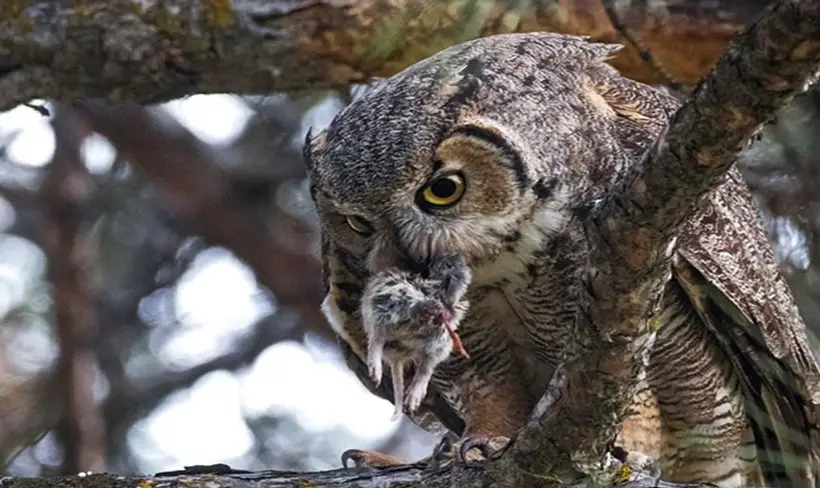
Proteins are necessary for muscle development and tissue repair, while carbohydrates provide the energy they need to hunt and other day’s activities. Vitamin A contributes to their eye health, which is crucial in spotting prey, and calcium for the development of strong bones.
These calories, vitamins, and nutrients come from their diet, mainly animal matter. And the prey animals that make up their diet, which include:
- Small mammals
- Insects
- Amphibians
- Fish
- Birds
- Reptiles
Why Do Owls Eat Fruits? Unveiling the Truth
Owls’ digestive systems are not adapted to digesting plant matter, which begs the question, why do they eat them? Following are some reasons why owls eat fruits.
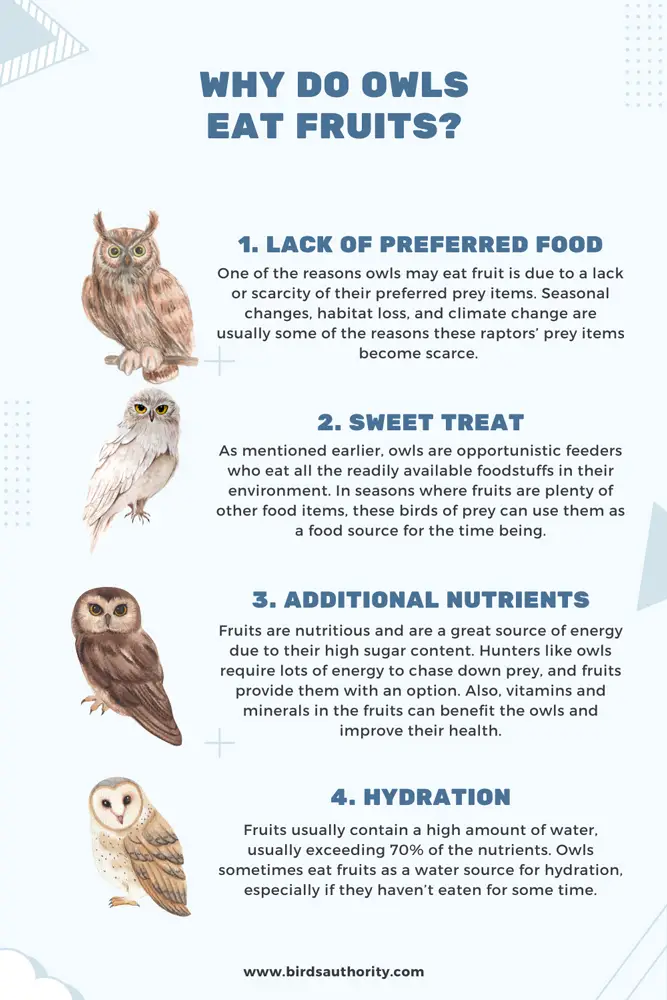
1. Lack of Preferred Food
One of the reasons owls may eat fruit is due to a lack or scarcity of their preferred prey items. Seasonal changes, habitat loss, and climate change are usually some of the reasons these raptors’ prey items become scarce. Also, diseases in prey animals can reduce their population.
Unlike the Eastern Screech Owl, which can eat insects during these times, other species have to turn to other food sources. Fruits make great substitutes in the meantime since they are available in most locations throughout most seasons.
Also, fruits provide them with some essential nutrients they need to survive before they catch prey.
2. Sweet Treat
As mentioned earlier, owls are opportunistic feeders who eat all the readily available foodstuffs in their environment. In seasons where fruits are plenty of other food items, these birds of prey can use them as a food source for the time being.
3. Additional Nutrients
Fruits are nutritious and are a great source of energy due to their high sugar content. Hunters like owls require lots of energy to chase down prey, and fruits provide them with an option. Also, vitamins and minerals in the fruits can benefit the owls and improve their health.
4. Hydration
Fruits usually contain a high amount of water, usually exceeding 70% of the nutrients. Owls sometimes eat fruits as a water source for hydration, especially if they haven’t eaten for some time.
Usually, owls get all the water they need from their prey during metabolism. As hydrogen in the prey animal’s fat gets oxidized, they get the water they need to survive. However, they also drink water from other sources, like lakes, ponds, and rivers.
What Fruits Can Owls Eat?
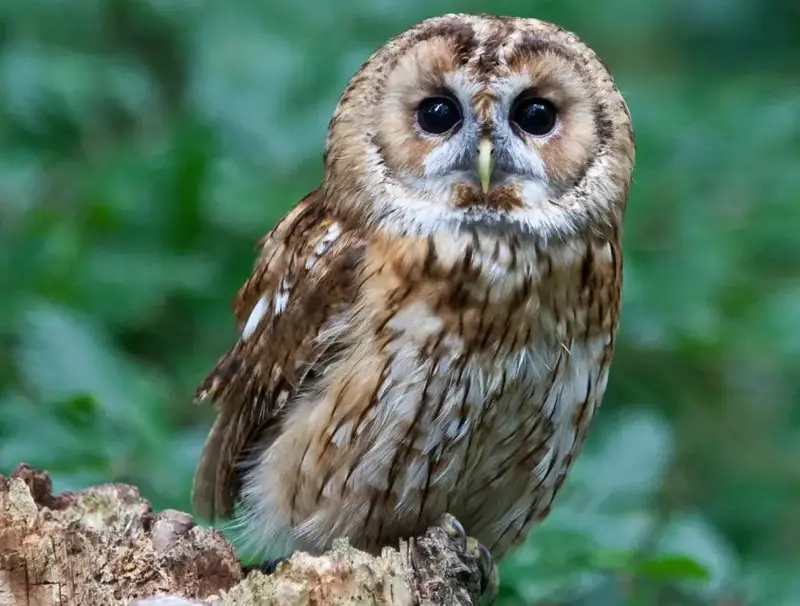
While hawks can eat fruits, they tend to eat some fruits more than others. Some of the fruits they enjoy eating include:
1. Figs
Figs are one of the fruits that various owl species tend to like feeding on. Spectacled owls are a species that enjoy this fruit from the ficus tree and benefit from the nutrients it contains.
2. Mangoes
Mangoes are some of the soft and sweet tropical fruits that owls also enjoy eating. They are readily available in most areas where owls live, and various species, including great horned and barred owls.
3. Grapes
Owls also love grapes, especially the western screech owls found in most of western North America and Canada. Grapes are a great source of nutrients and antioxidants.
4. Bananas
Ripe bananas are also sweet fruits that various owl species tend to enjoy eating. They usually pick up fallen bananas off the ground, especially when small rodents are scarce.
5. Berries
Berries, including juniper and elderberries, are some types that various owl species enjoy snacking on. They prefer to eat ripe berries, which are sweet and tangy, rather than the unripe ones, which are sour.
6. Apples
Apples are Eurasian Scops owls’ favorite fruits. These birds are found in semi-open and arid landscapes on many continents. This and other owl species in areas where apple orchards occur occasionally feed on apples and benefit from the nutrients they carry.
Downsides of Owls Eating Fruits
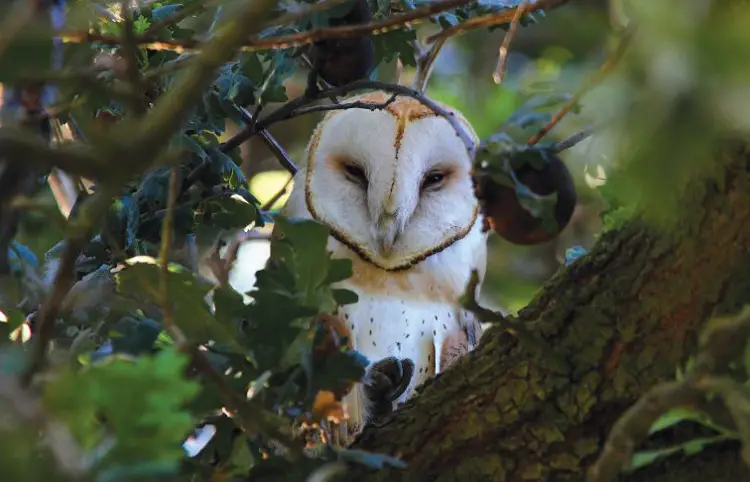
Behaviors that are out of normal usually come with risk, and owls eating fruits is among them. Following are some of the downsides of owls eating fruits:
1. Nutritional Deficiency
While fruits are nutritious, they do not contain all the nutrients owls require to remain healthy. These raptors can develop nutritional deficiencies if they feed on a fruit-based diet for a long time.
2. Digestive Problems
Another possible downside when owls eat fruits is they can develop digestive problems. Fruits usually contain fiber and carbohydrates, which can be hard to digest since their digestive systems are adapted to digesting meat. The owls may experience bloating, constipation, and diarrhea.
3. Behaviors Changes
There are possibilities of altering these raptors’ natural behaviors if fed too much fruit. These birds are hunters, and providing them with fruits most of the time can affect their hunting instincts. This can make hunting hard for them.
Should I Feed Owl Fruits?
Some people have owls living near or on their property in nest boxes. One way of attracting and befriending these raptors is by providing them with a food source.
These food sources usually include bird feeders to attract prey birds or feeding boxes for small mammals who are potential prey. However, some people also provide food directly to the owls in their nests.
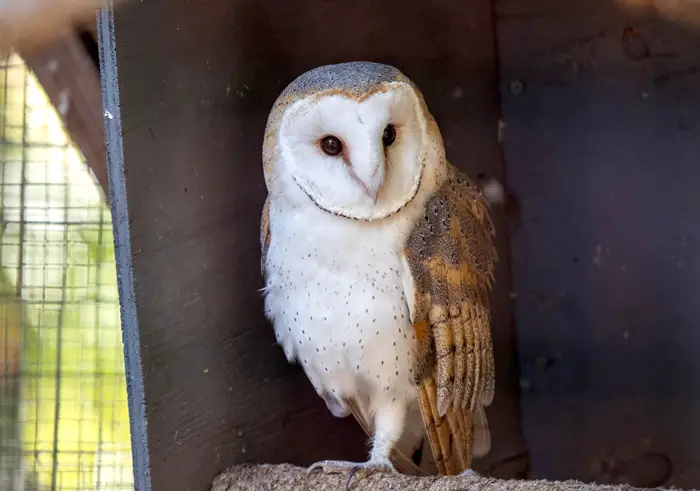
In this instance, you can provide fruit to the owls though not as their main food source. Remember, fruits don’t have all the nutrients the birds need to remain healthy. Therefore, make fruits an occasional snack for these opportunistic feeders to allow them to hunt and eat the right diet.
FAQs
Following are various questions that many people ask about the topic of whether owls eat fruits.
Owls do not need fruits in their diet and usually only eat them when their preferred food items are scarce. They get most of the nutrients they require from the prey animals they feed on, including water.
There are no known fruits that are specifically toxic to owls, as they’re not used to eating fruits. However, fruits that contain toxins, like the persin in avocado leaves and seeds, can cause avocado toxicosis. Avoid feeding owls in your environment this fruit to avoid health problems.
Yes. Some species of owls, like the burrowing owls, have been observed eating citrus fruits. These fruits are often sweet and sour, which makes them unlikable to most animals.
However, there are only a few observations of these raptors feeding on citrus fruit, and maybe they avoid them and take the sweeter options.
Bottom Line
Despite being raptors that primarily survive by feeding on other animals, owls can eat fruits. They may do so for various reasons, such as when their preferred prey is unavailable. Additionally, as opportunistic feeders, they may consume fruits simply because they are available and tasty.
Owls have been observed eating various fruits discussed in the article. These fruits carry nutrients and vitamins that can be helpful to these birds of prey once ingested. However, since their digestive system is better suited for breaking down animal matter, they may not extract all the nutrients from fruit.
